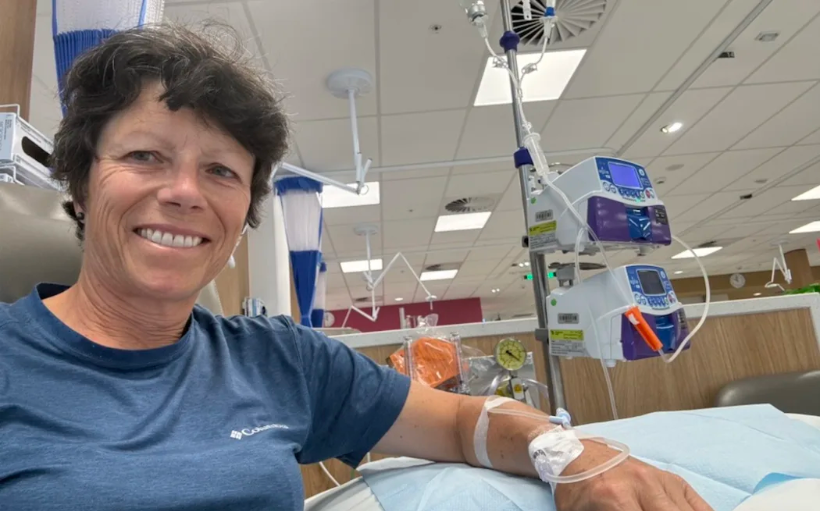Health
Cancer Patient Relocates to Australia for Life-Saving Treatment

A myeloma cancer patient has relocated from New Zealand to Australia to access life-prolonging medications unavailable in her home country. Jo Neep made the difficult decision after discovering that the treatment she needed, known as daratumumab, was funded in Australia but not in New Zealand. “I moved because I wanted life,” Neep told RNZ. Her journey highlights the struggles many face in accessing essential healthcare.
Neep had been living in Australia and frequently visiting New Zealand before moving to the South Island in 2015. Her life took a challenging turn when she was diagnosed with myeloma, a type of blood cancer, in 2017. After undergoing a stem cell transplant, she initially placed her trust in the medical professionals. “I was quite accepting, thinking that medics all knew what they were talking about. But they’re only limited by what they have available to them,” she reflected.
By 2022, Neep’s haematologists in New Zealand were advising her to seek treatment options across the Tasman Sea. The drug they recommended, daratumumab, is an immunotherapy that costs approximately $45 per dose in Australia. In contrast, private patients in New Zealand face a staggering cost of about $10,000 for the same medication. Neep described her choice as a “no brainer,” emphasizing the necessity of seeking better treatment options.
Neep is not alone in her quest for effective cancer treatment. She is among three medical migrants from New Zealand receiving care from her haematologist in Sydney. A former resident of New Plymouth has also returned to Australia for the same reason. Daratumumab is available in over 45 countries, yet it remains on Pharmac’s “options for investment” list in New Zealand, where funding is contingent upon budget availability.
Patients with blood cancers have expressed their frustration over what they perceive as broken promises from the New Zealand government regarding access to critical medications. During the 2023 election campaign, National Party leader Christopher Luxon emphasized the need for Kiwis to receive world-class cancer care at home. “Every minute counts in the battle against cancer, and we want Kiwis to have access to better treatments here at home,” he stated.
According to consultant haematologist Dr. Rodger Tiedemann, around 400 New Zealanders are diagnosed with myeloma each year, and many could benefit from daratumumab. He noted that trials demonstrate the treatment can lead to significant survival improvements, potentially extending life by four years or more.
Dr. Tiedemann expressed disappointment that patients are being directed to seek treatment overseas. “When patients are facing a shorter life expectancy, they’re going to miss out on years with their children,” he explained. The pressure to live fully during limited time frames drives patients to pursue options abroad, which is frustrating for both them and healthcare providers.
Despite the government’s recent increase in Pharmac’s budget by $604 million, which has funded 66 new medicines, critics argue that the clinical needs of blood cancer patients, particularly those with myeloma, remain unmet. The recent funding included six medications for blood cancers, but none specifically target myeloma treatment.
Leukaemia and Blood Cancer NZ indicated that only 115 patients would benefit from the newly funded drugs in the first year, leaving thousands without access to necessary treatments. Neep believes that the government is not prioritizing cancer care effectively. “I’m really grateful to the medical people in New Zealand. I know their hands are tied,” she said. She encouraged continued advocacy for change in access to cancer treatments.
The Cancer Control Agency’s recent analysis of blood cancer medications aimed to identify gaps in access between New Zealand and Australia. Their scores for various medications, including daratumumab, reflected the clinical trial data available at that time. However, the agency faced criticism for its narrow focus, as Dr. Tiedemann pointed out that the review disregarded a significant amount of literature supporting the drug’s efficacy.
The agency clarified that their assessment was not intended to determine which medications should be funded but rather to highlight disparities in access to treatments. The Prime Minister’s office has redirected inquiries regarding healthcare access to Health Minister Simeon Brown, who stated that the National Party is committed to prioritizing patients and ensuring timely healthcare access.
As Neep and others like her navigate the complexities of cancer treatment, their stories underscore the urgent need for comprehensive healthcare reform in New Zealand. Their pursuit of life-saving treatments serves as a reminder of the critical importance of accessible healthcare for all.
-

 World5 months ago
World5 months agoTest Your Knowledge: Take the Herald’s Afternoon Quiz Today
-

 Sports5 months ago
Sports5 months agoPM Faces Backlash from Fans During Netball Trophy Ceremony
-

 Top Stories2 weeks ago
Top Stories2 weeks agoTongan Star Eli Katoa Shares Recovery Update After Surgery
-

 Lifestyle5 months ago
Lifestyle5 months agoDunedin Designers Win Top Award at Hokonui Fashion Event
-

 Entertainment5 months ago
Entertainment5 months agoExperience the Excitement of ‘Chief of War’ in Oʻahu
-

 Sports5 months ago
Sports5 months agoLiam Lawson Launches New Era for Racing Bulls with Strong Start
-

 World5 months ago
World5 months agoCoalition Forms to Preserve Māori Wards in Hawke’s Bay
-

 Health5 months ago
Health5 months agoWalking Faster Offers Major Health Benefits for Older Adults
-

 Lifestyle5 months ago
Lifestyle5 months agoDisney Fan Reveals Dress Code Tips for Park Visitors
-

 Politics5 months ago
Politics5 months agoScots Rally with Humor and Music to Protest Trump’s Visit
-

 Top Stories5 months ago
Top Stories5 months agoUK and India Finalize Trade Deal to Boost Economic Ties
-

 Health3 months ago
Health3 months agoRadio Host Jay-Jay Feeney’s Partner Secures Visa to Stay in NZ









